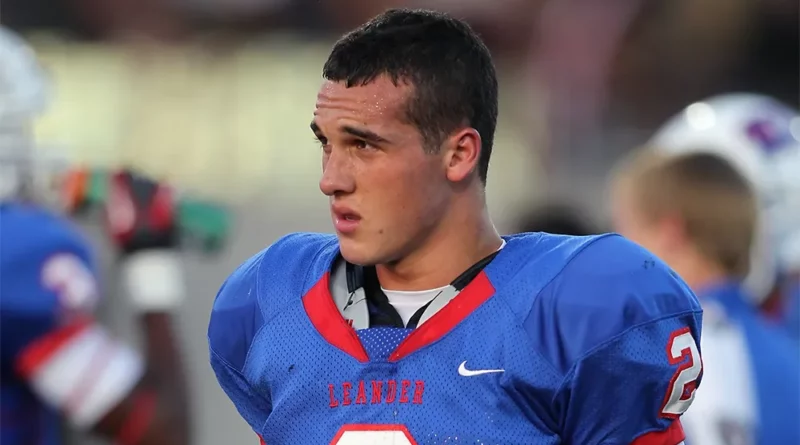Greg Kelley Falsely Convicted of Assault of a Minor in Cedar Park Texas
On August 9, 2013, police in Cedar Park, Texas arrested 18-year-old Greg Kelley, a standout football player at Leander High School. Kelley was a well-regarded athlete with aspirations to play college football. His arrest came as a shock to his family, teammates, and the broader community. He was accused of sexually assaulting a 4-year-old boy at an in-home daycare operated out of the home of a friend.
The charges were devastating. They immediately derailed his senior year and placed him in the center of one of the most controversial criminal cases in Texas in recent decades.
The Allegations and Daycare Connection
The allegations stemmed from children who attended an in-home daycare run by the family of Jonathan McCarty, a close friend of Kelley’s. McCarty’s mother operated the daycare out of her Cedar Park residence, and Kelley had been staying with the family during that summer.
One child told authorities that “Greg” had abused him, leading police to focus on Kelley as the suspect. Importantly, the child knew both Kelley and McCarty. Later analysis raised questions about whether the child had confused the two young men, especially since they had similar physical appearances and lived under the same roof.
At the time, however, investigators zeroed in on Kelley and quickly built their case.
The Investigation and Criticism
The investigation into Kelley’s case would later be described by courts and the Texas Rangers as deeply flawed. Cedar Park Police Detective Christopher Dailey led the inquiry. Critics argued that detectives failed to thoroughly pursue leads that pointed away from Kelley. For example:
- Interviews with the child victim were described as leading, with investigators asking suggestive questions.
- No physical evidence tied Kelley to the crime.
- Other potential suspects, including Jonathan McCarty, were not adequately investigated.
- The daycare environment itself was not properly assessed to determine whether abuse may have occurred under other circumstances.
The narrow focus on Kelley created what legal experts would later describe as “tunnel vision.”
Trial and Conviction
In July 2014, Kelley stood trial in Williamson County. Prosecutors presented the testimony of the child and argued that Kelley had used his access to the daycare to commit the assault. Despite the lack of forensic evidence, the jury found him guilty.
He was sentenced to 25 years in prison without the possibility of parole. Because he agreed to waive his right to appeal as part of a plea arrangement that reduced his sentencing exposure, Kelley had little immediate legal recourse.
The conviction stunned his supporters and divided the community. Some believed justice had been served, while others insisted that an innocent young man had been railroaded by a flawed system.
Community Response and Growing Doubts
As Kelley began serving his sentence, doubts about the integrity of the case grew louder. Community members organized support groups, rallies, and campaigns proclaiming his innocence. His family tirelessly advocated on his behalf.
These efforts drew attention from legal organizations and the media. Many began to question whether the wrong person was behind bars while the real perpetrator remained free.
Kelley’s case began attracting coverage beyond Central Texas, eventually gaining national attention.
The Breakthrough: Habeas Corpus and Texas Rangers
By 2017, new legal efforts were underway to secure Kelley’s release. His attorneys filed a writ of habeas corpus, alleging that the original investigation was deeply compromised and that his constitutional rights had been violated.
The Texas Rangers, brought in to review the case, supported these concerns. Their findings revealed multiple deficiencies in the original investigation, including the failure to thoroughly vet Jonathan McCarty as a suspect.
The habeas hearing became a turning point. Testimony highlighted that the child’s identification of Kelley may have been mistaken. Experts emphasized the unreliability of the interviews and the lack of corroborating evidence.
Williamson County District Attorney Shawn Dick, who had taken office after Kelley’s conviction, supported the call for relief. Dick acknowledged that the investigation had been incomplete and unfairly focused only on Kelley.
Release on Bond
In August 2017, after serving more than three years in prison, Kelley was released on bond while the Texas Court of Criminal Appeals reviewed his case. For Kelley and his family, it was a bittersweet moment: he was free, but not yet exonerated.
Supporters celebrated his release as a step toward justice, but Kelley still faced the weight of being a convicted felon until the appellate process was complete.
Exoneration by the Texas Court of Criminal Appeals
On November 6, 2019, the Texas Court of Criminal Appeals issued a landmark ruling. The court unanimously granted Kelley habeas relief, concluding that he had been denied a fair trial and that new evidence established his actual innocence.
Later that month, on November 27, 2019, a Williamson County judge formally exonerated him in court. The declaration of actual innocence meant that Kelley was cleared of all charges, eligible for compensation from the state, and legally recognized as wrongfully convicted.
The courtroom scene was emotional, with Kelley, his family, and supporters in tears as his name was officially cleared.
Civil Lawsuit and Settlement
In 2020, Kelley filed a civil rights lawsuit against the City of Cedar Park, its former police chief Sean Mannix, and Detective Christopher Dailey, alleging misconduct and a fundamentally flawed investigation.
In July 2022, Cedar Park agreed to settle the lawsuit for $500,000. The settlement did not undo the years Kelley spent imprisoned, but it represented an acknowledgment of the failures that led to his wrongful conviction.
Kelley later used part of the compensation to buy a home for his mother, symbolizing his determination to rebuild after years of lost freedom.
Media Attention and “Outcry”
The case was featured in Outcry, a five-part Showtime documentary released in 2020. The series explored the details of Kelley’s arrest, trial, and eventual exoneration. It highlighted the passionate community support, the systemic flaws in the investigation, and the human cost of wrongful convictions.
The documentary brought even greater national attention to Kelley’s story, placing it alongside other high-profile cases that illustrate the dangers of flawed police work and prosecutorial overreach.
Return to Football
Despite losing crucial years of athletic development, Kelley pursued his dream of playing football after his release. In 2020, Eastern Michigan University offered him a scholarship. Though his time on the field was limited, his return to the sport symbolized resilience and hope.
Football remained part of Kelley’s identity, and his journey back to the game demonstrated his refusal to be defined solely by the wrongful conviction.
Aftermath and Legacy
Greg Kelley’s case remains a cautionary tale about the criminal justice system. It underscores the consequences of inadequate police investigations, the dangers of tunnel vision, and the trauma inflicted by wrongful convictions.
His story has influenced broader conversations about criminal justice reform in Texas, particularly regarding how child-abuse cases are investigated and prosecuted. It has also inspired many to push for higher standards of accountability for law enforcement and prosecutors.
Today, Kelley continues to rebuild his life. Though the scars of wrongful imprisonment cannot be erased, he has become a symbol of perseverance and the fight for justice. His case serves as a reminder that justice delayed, though devastating, can eventually be achieved.
Discover more from City Towner
Subscribe to get the latest posts sent to your email.




